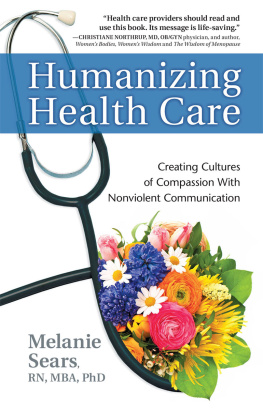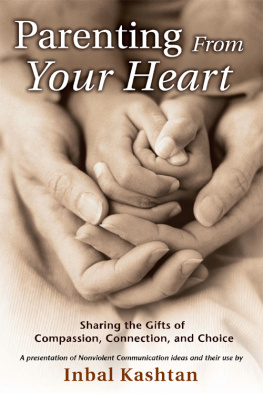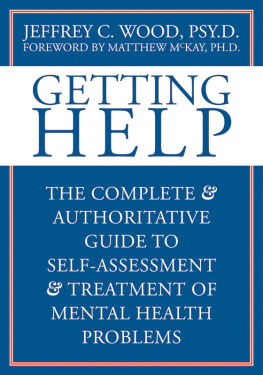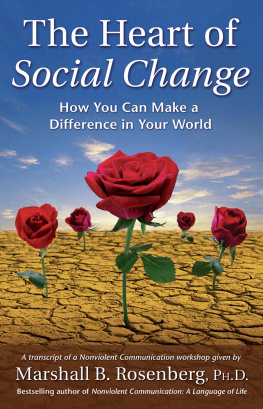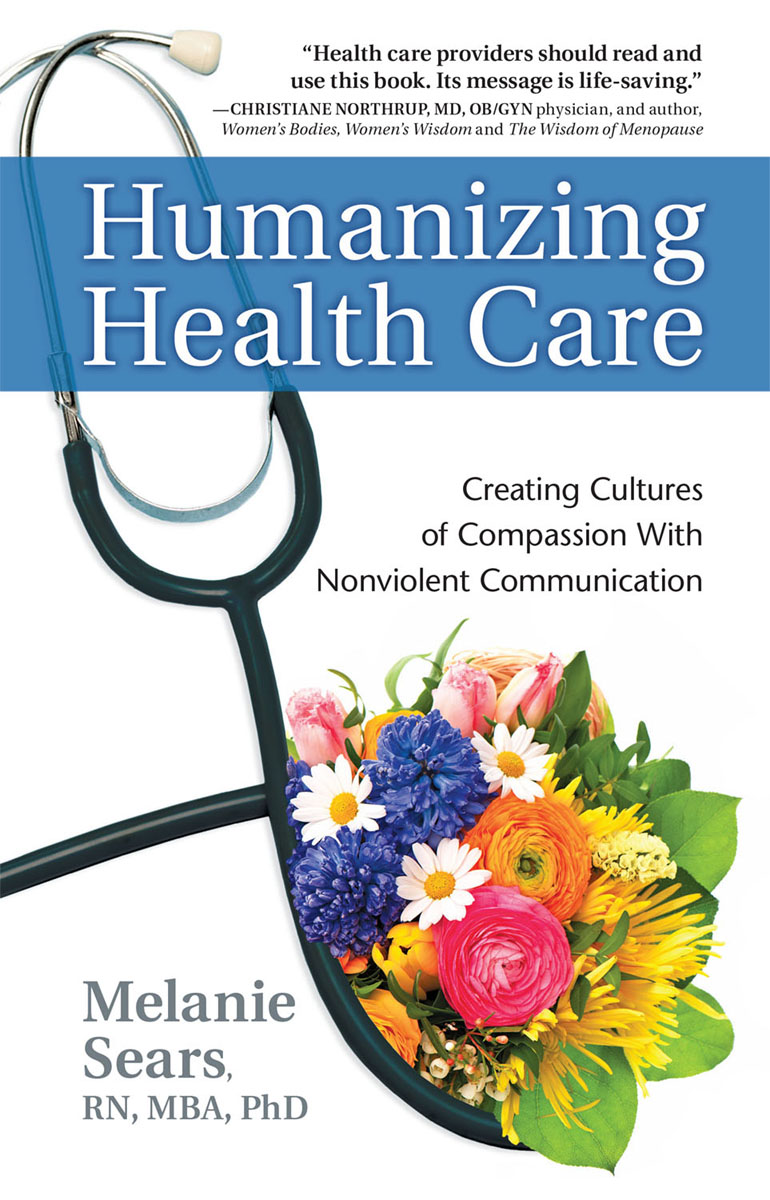
Humanizing Health Care
Creating Cultures of Compassion With Nonviolent Communication
2010 PuddleDancer Press
A PuddleDancer Press Book
All rights reserved. No part of this publication may be reproduced, distributed, or transmitted in any form or by any means, including photocopying, recording, or other mechanical or electronic methods, without the prior written permission of the publisher, except for use as brief quotations embodied in critical reviews and certain other noncommercial uses as permitted by copyright law. To request permission, contact the publisher at the following address, Attention: Permissions Coordinator.
PuddleDancer Press, Permissions Dept.
2240 Encinitas Blvd., Ste. D-911, Encinitas, CA 92024
Tel: 1-760-652-5754 Fax: 1-760-274-6400
Ordering Information
Please contact Independent Publishers Group,
Tel: 312-337-0747; Fax: 312-337-5985; Email: for other contact information and details about ordering online
Author: Melanie Sears
Editor: Sara Saltee
Cover and Interior Design: Lightbourne, Inc., www.lightbourne.com
Indexer: Phyllis Linn, Indexpress
Cover Source Photographs: www.gettyimages.com
Manufactured in the United States of America
1st Printing, August 2010
10 9 8 7 6 5 4
978-1-892005-26-7
What People Are Saying About Humanizing Health Care:
When health care providers know how to communicate clearly about human needs and the emotions that signal them, the entire heath care terrain changes. Hearts open and we can all give and receive the best possible health care. Heres my advice. Read and use this book. Its message is life-saving.
CHRISTIANE NORTHRUP, MD, OB/GYN physician, and author of the New York Times bestsellers: Womens Bodies, Womens Wisdom and The Wisdom of Menopause
Humanizing Health Care is beautifully designed and cogently addresses better communication skills in a straightforward, practical manner. The author discusses psychiatric ward settings for many of her communication examples, but the communication techniques she explains can be used anywhere to improve relations and to more empathically connect with others, be they patients, clients, students, or friends and family. A lovely book.
PETER R. BREGGIN, MD, author, Medication Madness, Heart of Being Helpful, and Toxic Psychiatry
Finally, a book that addresses the need to change our delivery of health careturn the focus from diagnoses, labels, and judgments into possibilities of health and healing through compassion, caring, and connection.
SYLVIA HASKVITZ, MA, RD, author, Eat by Choice, Not by Habit, and CNVC Certified Trainer
Humanizing Health Care is a valuable resource for all care providers and consumers who are interested in being partners in the recovery process. This book shares practical skills required for use in creating a trauma informed and trauma sensitive environment.
DONNA RIEMER, RN, PMHN-BC, Certified Traumatologist
In Humanizing Health Care, Melanie Sears provides an invitation for those who lead and work in health care environments to revolutionize the way we provide health care. She provides the tools that will help create the kind of environments that truly provide the safety, the compassion, and the efficiency that our health care systems so desperately need. I dream of working in an environment that has adopted these tools.
JOAN KELLY, LICSW, GMHS, MT-BC
As a patient in a psychiatric hospital and a recipient of Mels empathy skills which she outlines with such clarity in this book, I was able to heal emotionally both from my original wounding and the trauma of being hospitalized. Having a witness to my intense feelings helped me gradually find trust in myself again.
JOANNE LANE, mother, civil engineer, and survivor of mental diagnosis
Humanizing Health Care is a call from the heart to transform our health care system into a system that cares about peoples health and about the health of the people who work in it. As Melanie articulately and insightfully shows, the two are inseparable. Humanizing Health Care teaches honesty without fear, responsibility without blame, and power without exploitation.
GABOR MAT, MD, author of When The Body Says No: Understanding The Stress-Disease Connection
Contents
Preface
Why I wrote this book
I wrote this book because I have seen such suffering among both patients and staff in every health care facility where I have worked. When my own personal journey of healing brought me in touch with Nonviolent Communication (NVC), I knew I had found a set of tools with tremendous potential to put an end to that suffering. As a health care professional, I continue to feel moved by the possibilities of healing the organizations we count on to heal us.
In our current systems, patients suffer because when they are the most vulnerable, the care they receive in hospitals is often mechanical and less than compassionate. All the focus is on a patients illness and none is on their emotional needs. And more troubling yet is the way our hospitals are organized around the utterly false premise that our physical and emotional selves are two completely separate systems. When we act as if we can treat one without acknowledging the other, the results are damaging and sometimes even catastrophic.
Staff suffer, too, because they work in environments where the lighting is artificial, the noise level is constant, the work hours long, the staffing short, and emergencies involving peoples lives are routine. In the midst of such fundamentally stressful environments, staff-to-staff interactions are often hostile and defensive. In settings where teamwork is necessary to deliver quality care and save lives, interpersonal conflicts and closed communication are more often the rule. Most of all, staff suffer because their highest purpose and most compassionate impulses to care and heal are diminished and corrupted by organizations that reinforce artificial power hierarchies and systematically devalue the emotional lives of everyone involved.
I hope that by sharing the tools that were instrumental to me in my own healing journey I can contribute to a more peaceful world and a more compassionate health care system. I am confident that these tools can create systems that serve humanity better by fostering connections rather than violence.
I believe this book will be useful to administrators committed to better patient outcomes, less staff burnout, and better staff relationships. I hope it will also serve the wonderful health care professionals who need to feel understood for their experiences. And, I believe this book will also be healing for patients who have utilized health care and havent been able to articulate why and how their needs were not met.
Throughout this book, I share stories of specific challenges and solutions Ive encountered in my work as a nurse on an involuntary psychiatric unit, and I use these to illustrate how important NVC could be to the health care industry. My belief is that if NVC can create harmony and peace in the emotionally charged environment of a psych unit, there are no limits to how effective it can be in all areas of the hospital.
There are simply no known physical or mental illnesses that cannot be better treated with compassion than without. And, when hospital staff are supported in expressing their natural compassion, speaking the truth, and articulating feelings and needs, the quality of care willand doesskyrocket. We have it in our power to end the suffering that is so endemic to our health care organizations. What are we waiting for?
Next page
